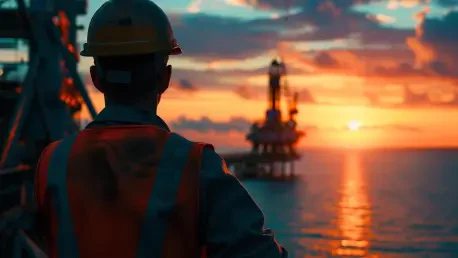In the heart of Florida, where sun-kissed beaches draw millions of tourists each year, a storm is brewing far more threatening than any hurricane, as President Trump’s proposal to expand offshore drilling in the eastern Gulf of Mexico has thrust the state into a fierce battle. This plan pits energy ambitions against the sanctity of coastal economies and environments, with the specter of oil rigs looming just beyond the horizon rekindling haunting memories of the 2010 Deepwater Horizon disaster, which unleashed millions of barrels of oil into the Gulf. This isn’t merely a policy debate; it’s a defining moment for communities whose livelihoods depend on pristine shores. What drives such intense resistance to this plan, and why does it resonate far beyond Florida’s borders?
The Coastal Clash in Florida
The proposal to sell offshore leases in the eastern Gulf, bringing drilling closer to Florida’s iconic coastline, has sparked immediate alarm among residents and leaders alike. The plan, spearheaded by the Interior Department, aims to bolster energy production but risks tainting the very landscapes that define the state’s identity. Tourism, a cornerstone of Florida’s economy generating billions annually, hangs in the balance as fears of environmental catastrophe loom large.
Opposition isn’t confined to activists or environmentalists; it cuts across political lines with striking intensity. Prominent Florida Republicans, often aligned with Trump’s broader agenda, have drawn a hard line on this issue. Rep. Vern Buchanan has warned of the devastating impact on tourism and real estate, emphasizing that a single spill could erase decades of economic progress. The collective memory of blackened beaches and dying wildlife from past disasters fuels a visceral pushback, turning this into a fight for the state’s future.
Energy Ambitions Versus Environmental Fears
At the core of this controversy lies a broader tension within U.S. energy policy—a relentless drive for “energy dominance” clashing with the urgent need to safeguard natural treasures. The administration’s focus on expanding fossil fuel production seeks to secure energy independence, but at what cost? Florida’s coastline isn’t just a postcard image; it’s an economic engine, with tourism and property values contributing over $100 billion yearly to the state’s coffers.
This isn’t an isolated struggle but part of a national debate on balancing economic growth with ecological risks. The Deepwater Horizon spill, which cost the Gulf region more than $17 billion in damages across multiple sectors, serves as a grim reminder of what’s at stake. As global climate concerns intensify, the push for drilling feels like a step backward to many, amplifying the urgency to rethink energy strategies in a world increasingly hungry for sustainable solutions.
Dissecting the Depths of Resistance
The opposition to the drilling plan is a complex tapestry woven from environmental, economic, and political threads. Environmentalists point to the catastrophic potential of oil spills, which could ravage marine ecosystems and poison coastal waters for generations. Rep. Gus Bilirakis has openly questioned whether a proposed 100-mile buffer zone offers any real protection, reflecting deep skepticism about federal safeguards.
Economically, the stakes couldn’t be higher for a state where beaches are synonymous with prosperity. Sen. Rick Scott has demanded the continuation of a moratorium on eastern Gulf drilling, underscoring the threat to jobs and livelihoods. Politically, even staunch allies like Gov. Ron DeSantis and Sen. Ashley Moody have voiced alarm, with Moody labeling the plan “highly concerning” and advocating for a permanent ban. This rare bipartisan unity, mirrored by California’s resistance under Gov. Gavin Newsom, signals a national divide over fossil fuel expansion, framing the issue as a broader stand against unchecked industry influence.
Voices That Echo and Evidence That Warns
The chorus of dissent isn’t just passionate—it’s grounded in credible voices and stark data. Sen. Scott’s insistence on maintaining protective measures reflects a profound distrust in promises of safety from federal agencies. Rep. Buchanan’s warnings about economic fallout are backed by studies estimating that another major spill could dwarf the $17 billion toll of Deepwater Horizon, especially given heightened climate vulnerabilities today.
Environmental experts add weight to these concerns, cautioning that current conditions could amplify the impact of any disaster. The unified stance of Florida’s leadership, transcending party loyalty, prioritizes state interests over national energy goals. Beyond local borders, the echoes of resistance in California and elsewhere highlight a growing consensus that coastal protection must take precedence, fueled by hard lessons from history and a shared resolve to prevent another tragedy.
Charting a Path Through the Controversy
Amid this heated debate, tangible steps exist for those eager to influence the outcome of the drilling proposal. Staying informed through reliable updates from the Department of the Interior and local Florida news sources offers clarity on evolving policies and opportunities for public input. Engaging with community coalitions, as seen in the successful pushback of 2018, can amplify collective voices and sway decision-makers.
Supporting alternative energy initiatives provides a counterpoint to fossil fuel reliance, with examples like Oregon’s rapid clean energy deployment showing viable paths forward. Direct advocacy, through contacting elected officials or attending town halls, ensures that the concerns of leaders like Sen. Scott and Rep. Buchanan resonate at higher levels. These actions empower individuals and communities to shape an energy future that balances economic needs with the imperative to protect irreplaceable coastal ecosystems.
Reflecting on the Battle for the Coast
Looking back, the fierce opposition to Trump’s offshore drilling plan stood as a testament to the power of unified resolve in Florida and beyond. The clash revealed deep-seated fears of environmental ruin and economic loss, driven by vivid memories of past disasters. Leaders across political divides rallied to defend their state’s lifeblood, while national and even global voices joined the fray, highlighting a shared stake in safeguarding natural heritage.
As the dust settled, the path ahead demanded sustained vigilance and proactive engagement. Communities were urged to keep pressure on policymakers, advocating for permanent protections against risky drilling ventures. Exploring renewable energy options became not just an alternative but a necessity, ensuring that future generations inherited thriving coastlines rather than scarred legacies. The fight underscored a critical truth: protecting vital ecosystems required ongoing commitment, a lesson that shaped energy debates for years to come.









